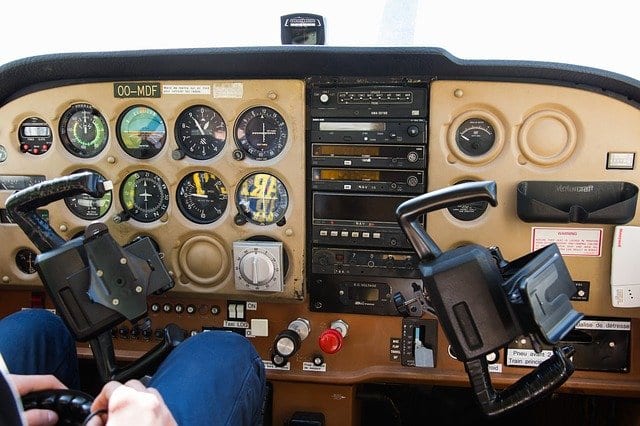The Cessna 172 reached its flight path at 5,000 feet. Looking down, Franklin felt the height grip at his balls like a woman with chilly hands, and he knew he’d be hearing her voice soon. He was below the few fluffy clouds but swore that whenever he passed beneath one he could smell cotton candy—the sky was the color of blueberry ice.
Franklin was 65 years old and about as successful as money and an executive position can make a man. He was an attorney who had become one of the top leaders in a billion-dollar tech firm that made electronic sensors for the healthcare industry. He was eventually awarded Chief Operating Officer at Bio Electrosense Corp in recognition of the indispensable role he played.
He was pleased with his position, pleased with his compensation, pleased with his family—he had three children—and pleased with his life. His favorite hobby was flying his small airplane, and he was also pleased that he could combine his favorite hobby with his business needs, flying himself to the company’s offices up and down the West Coast, even as far east as Denver while the company picked up the tab.
Life was good. This was particularly true in the last 20 years since he had murdered his wife. They did not get along. Evelyn talked too much. Even worse, everyone else talked to her too much. She was into everyone else’s business. Men, women, or children, it didn’t matter. He would tell her to stay home and she would go out. He built a veritable palace for her, 7,000 square feet with a tennis court, miniature golf course (the kids loved miniature golf), and swimming pool. But she never stayed home. Evelyn volunteered at the Friends of the Library functions. She joined the PTA at the children’s private school. She helped out at the animal shelter, and wherever she went, she met people and invited them into her life.
Franklin and Evelyn argued a lot. She wanted to move back east and he liked it in California. She thought he was too much of a disciplinarian with the children, and he felt he needed to have more influence because he spent so much time at work. They never fought in front of the children, Franklin insisted on that, and so the three kids thought their parents had a model marriage, which was funny because Evelyn had been a model before Franklin swept her off her feet.
When Evelyn started talking about divorce, the worst part for Franklin wasn’t the thought of saying goodbye to Evelyn, it was losing all that money. You would think that a high-powered lawyer would have more sense than to get married without a prenuptial agreement, but that was exactly what he had done.
But that wasn’t the only problem. He was concerned with how the kids would view him after the divorce. Evelyn would get custody and she would be able to tell them anything. She might say he was cheating on her, or that he was cruel to her; she could make up any story she wanted since the kids would be with her. He loved his children and simply couldn’t bear the idea of their thinking less of him. To Claire, Michael, and Tim, he was a hero dad. That meant more to him than all his money.
Evelyn adored her sister, Marybeth, and when she died of cancer, Evelyn was disconsolate. She took to bed in the afternoon and stayed there until 4:00 in the morning when she got up to drink coffee. Sometimes, on the weekends, Franklin would go upstairs to their bedroom and try to convince her to join the family for dinner, but she would say that she wasn’t ready.
Franklin knew a lot of compromised doctors from his days doing medical malpractice work. It was not hard to get one doctor to write him a prescription for Potassium Chloride and another doctor to write a script for Calcium Gluconate. He purchased hypodermic needles and syringes, mixed both drugs together and then went to Evelyn in their bedroom. The kids knew that every weekend since Aunt Marybeth died, Dad would ask Mom to join them for dinner.
As usual, he asked her to come downstairs and as usual she rolled over on her side with her back to him. He brought the needle out from the pocket of his blazer and walked over to the bed holding the needle in front of him in his right hand. He started massaging her calves with his left hand as she looked away.
“What are you doing, Franklin?” she asked. But he had located the vein, held down her leg, and rapidly injected her.
Her eyes widened in horror but he was prepared, and before she could scream he had a pillow over her face, practically filling her mouth. She struggled and he thought that was good since it would make her heart beat faster and deliver the poison more quickly. There wasn’t time for her to suffocate because the drugs rapidly did their work. She was having a heart attack, and she died within five minutes. There would be no indications of suffocation and the compounds in the drugs that had caused the massive clot that destroyed her heart would be broken down to chemicals the body naturally produces in about an hour. He carefully daubed the tiny spot made by the hypodermic needle.
He went downstairs and told the kids that, as usual, Mom wouldn’t be coming down for dinner. After an hour and a half, he asked Claire to go upstairs to see if she could convince her mother to join them. An appeal from Claire had worked once before.
Franklin felt really bad about doing this to his daughter. He knew it would be traumatic to find her mother dead. But of his three children, she would have the most intense response to finding the corpse and he needed that reaction if his story was to be believable. Her scream was heart-rending. They all ran upstairs and were shocked. Franklin called the police and ambulance and they showed up in about 8 minutes. The county coroner confirmed cause of death was a heart attack. One detective seemed suspicious, returning to the house for a couple of weeks to ask about their marriage. Franklin spoke as little as possible and appeared very broken up. He wondered why this particular detective was so interested and if he were a member of the Friends of the Library, the PTA, or volunteered at the animal shelter? But he didn’t worry about it.
~~~OOO~~~
Evelyn’s death, 20 years ago, paved the way for Franklin to be the main care provider for his beloved children, and they adored him. He was ever more successful in his career. For the last 18 years, he dated Cindy, who was much younger and perfectly content in a relationship that allowed her to travel around the world, paid for her apartment, and kept her at a distance from any intimacy.
Whenever possible, Franklin got into his Cessna and took off. But something started happening about a year ago. When he reached his cruising altitude, Evelyn’s ghost would join him. At first, he would see her pale, nearly transparent face in the plane’s windshield. When he looked at the instrument panel, her face was there looking back.
The first time it happened, he began screaming hysterically. He snapped his head back from the windshield. Luckily, it was a windless day and the plane didn’t veer. He turned back to the airport, landed, and didn’t fly again for two months.
He missed flying, though, and had business travel needs. He told himself it was a hallucination caused by stress. So, he took off again on a day when the sky was light gray like concrete. When he reached cruising altitude, Evelyn was in the copilot seat next to him. He screamed again, screamed and screamed; he couldn’t stop. Evelyn’s ghost let out a barely audible, mocking laugh—the sound of sandpaper rubbing velvet. It sobered him immediately. He stopped screaming.
Whispery at first, but gaining body as she spoke, Evelyn said, “You’ve become old, old, too old to fly.”
He started to scream again. This time he was losing control of the Cessna. She laughed one more time, and again it stopped his screaming.
“That last moment was terrible, Franklin. Knowing you were killing me. I was panicking, needing air, but you stuffed that pillow in my mouth and covered my face. No air, Franklin, no air.”
He began screaming again, and almost blacked out while she continued to talk, though now he couldn’t make out her words. Somehow, he landed the plane, but didn’t stop screaming until one of the field attendants came to meet him. Franklin realized that Evelyn was no longer next to him. He must have looked a mess because the attendant called an ambulance.
Franklin no longer wanted to fly. But time and again he found himself heading to the airport. He would often wake up around 3:00 am, rapidly get dressed and drink some coffee, then go to the Cessna. When he reached cruising altitude, Evelyn would be there next to him. Sometimes all she did was ask questions over and over. “Why did you kill me and not just divorce me?” Over and over. “Do my children speak of me?” She wouldn’t pause for an answer—she just kept asking.
Sometimes she would recite her story again and again for as long as he was in the air. “I was lying in bed. You came in the room and asked me to come downstairs. But you knew I wouldn’t. You knew I would roll away from you. You stroked my leg as if you loved me until you found the vein, then held my leg down and injected me with poison. The police never knew it was murder.” Each time she told the story, she added more details, recounting her horror over and over until he landed.
Franklin thought he was in hell. But he couldn’t stop flying the Cessna.
Sometimes he tried to answer her. “I had no choice. You were going to ruin me. You were going to turn the children away from me, make them hate me.” Her voice was faint, and when he yelled, he couldn’t hear her.
He realized that when he was speaking, she would simply stare at him. Sometimes she looked like a portrait of Evelyn in white smoke. Sometimes she looked like she was made of water. It was Evelyn, translucent, insubstantial, unmistakably present. If only to silence her terrible voice in his head, he would talk and talk.
“I tried to kill you as painlessly as possible. Wasn’t it fast? I didn’t want you to suffer.” For a while he would say he was sorry, but that would bring her terrible laugh that made him scream when he wasn’t screaming and stop when he was. So, he stopped saying he was sorry. But he didn’t stop talking because he didn’t want her to start.
“It was best for the children. I did a really good job with them.” Her white smoke began to darken. He grew afraid. “The house is exactly as you left it—we didn’t change a thing. The kids wouldn’t hear about changing anything.” He kept talking until he landed.
In the past year, he looked for any opportunity to fly that he could find. As soon as Evelyn’s ghost was in the copilot seat he would start to talk. He had never talked this much in his life. “I really didn’t know what to do when Claire started dating, and I used to wish back then that I hadn’t…that you were still alive. Her second boyfriend took the cake, he…” Franklin saw that Evelyn was staring at the dashboard. He had gotten so distracted that he was losing altitude and she was pointing at the altimeter. He corrected his flight and continued until he landed.
The next time Franklin flew, Evelyn wouldn’t stop laughing. It was horrible. His hands were shaking and he couldn’t control the plane well. The tower radioed him to ask about his welfare, and that helped calm him down, knowing that people existed, that there was something beyond the sharp edged blue box he flew in with clouds that looked like razors. As he brought the plane down, he heard Evelyn’s ghost say, “Too old to fly,” in a voice like sandpaper rubbing velvet. He barely managed to land the Cessna and the airport crew greeted him with concern.
Some days he would scream at the ghost, “What do you want? Why are you here?” When he wasn’t panicked, he became filled with curiosity. “Why do you come when I am flying? Is it easier to visit when I’m closer to the sky?” She never answered him. At those times, he couldn’t help but ask himself why he kept flying at all?
Still, Franklin wanted to spend more and more time in the air. His children remarked that he was flying more than ever before. Claire pointed out to her brothers that their father was losing weight, had dark circles under his eyes, and had developed a tremor in his hands. But he always seemed to be in a good mood, and he was as engaged in running his company as he had ever been. Certainly no one at work noticed any changes, or said they did.
The Cessna reached its cruising altitude of 5,000 feet. By the time he leveled off, the sky had turned from berry blue to gray. Somehow the Cessna had either climbed above the clouds or the clouds had sunk closer to the ground. Either way, he was above the clouds and it looked as if the small plane skated along an icy-gray highway. Franklin was talking as Evelyn’s ghost appeared, first as a disembodied face in the windshield, then fully formed in the copilot seat next to him.
“Claire at least notices me, though she doesn’t pay attention and doesn’t require her children to visit,” he prattled on. “And since the two boys got their divorces, they never speak to me at all. It’s as if I didn’t raise them.” Every now and then, Franklin looked at the ghost of Evelyn to see if she were turning from white smoke to dark. Nothing mattered more to him than how she would respond. She was still light, still staring at him, not at the dashboard but at him, not at the ground below but at him, or maybe right through him to another world far in front of the accelerating plane.




















